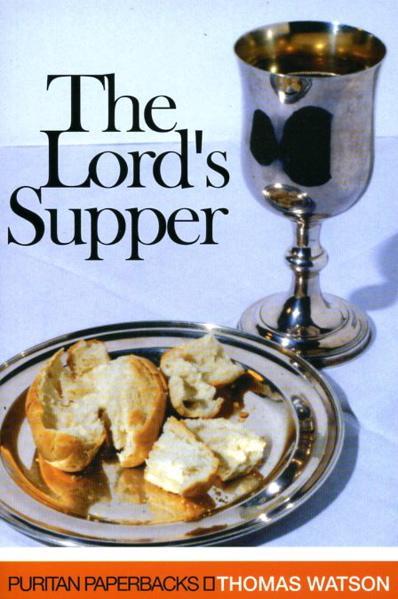
Product Details
- Cover Type:
- 96 Pages
- Publisher: Banner of Truth
- Publication Date: February 2004
- ISBN: SWATSOTHLORDSSUPPER9780851518541
The Lord's Supper (Puritan Paperbacks)
To Thomas Watson, the Lord’s Supper was a visible sermon, a mirror in which to gaze on the sufferings and death of Christ. ‘God, to help our faith, does not only give us an audible Word, but a visible sign.’ But more than this, the Supper was a time in which to partake of the benefits of Christ’s death by faith, to be fed and cherished by the Lord in his own banqueting house, and to obtain a foretaste of the glory which will be fully realized only in heaven. Watson’s aim was to stimulate greater love to Christ in His people, and to enhance their appreciation of the Supper as a spiritual feast for all believers. His fine exposition shows the rich provision made in the Supper for all who love the Lord, while it also lays bare the emptiness of all mere sacramentalism.
About the Author
Thomas Watson (c. 1620-1686), the Puritan preacher and author, was probably born in Yorkshire, although the exact place and date of his birth are unknown. He studied at Emmanuel College, Cambridge (BA, 1639; MA, 1642), where he was apparently a diligent student. Certainly his intellect is apparent in his writings, which show a profound grasp of the English language, as well as a solid understanding of Hebrew, Greek, and Latin. He quotes from the early church fathers, and his familiarity with the breadth of the scriptural canon is stunning. Cross-references from the entire biblical corpus are sprinkled throughout his sermons, revealing a deep understanding of many texts obscure to most modern day Bible students. A solid understanding of history, botany, medicine, physics, the classics, logic, and various trades are revealed in his sermons.
After living for a time with the Puritan family of Lady Mary Vere, the widow of Sir Horace Vere, Baron of Tilbury, in 1646 Watson went to St. Stephen’s, Walbrook, London, where he served as lecturer for about ten years, and then as rector for another six years. In about 1647, he married Abigail Beadle, daughter of John Beadle, an Essex minister of Puritan convictions. They had at least seven children in the next thirteen years, four of whom died young.
During the Civil War, Watson began expressing his strong Presbyterian views. He had sympathy for the king, however. He was one of the Presbyterian ministers who went to Oliver Cromwell to protest the execution of Charles I. Along with Christopher Love, William Jenkyn, and others, he was imprisoned in 1651 for his part in a plot to restore the monarchy. Although Love was beheaded, Watson and the others were released after petitioning for mercy.
Watson was formally reinstated to his pastorate in Walbrook in 1652. Spurgeon says of him:
"he executed for nearly sixteen years the office of a faithful pastor with great diligence and assiduity. Happy were the citizens who regularly attended so instructive and spiritual a ministry. The church was constantly filled, for the fame and popularity of the preacher were deservedly great. Going in and out among his flock, fired with holy zeal for their eternal welfare, his years rolled on pleasantly enough amid the growing respect of all who knew him."
With the Act of Uniformity in 1662, Watson was ejected from his pastorate. He continued to preach in private whenever he had the opportunity. In 1666, after the Great Fire of London, Watson prepared a large room for public worship, welcoming anyone who wished to attend. After the Declaration of Indulgence took effect in 1672, Watson obtained a license for Crosby Hall, Bishopsgate, which belonged to Sir John Langham, a patron of nonconformists. Watson preached there for three years before Stephen Charnock joined him. They ministered together until Charnock’s death in 1680.
Watson kept working until his health failed. He then retired to Barnston, in Essex, where he died suddenly in 1686 while engaged in private prayer. He is buried in the same grave as his father-in-law who served as a minister at Barnston. Watson’s works – several of which have been republished by the Trust – are a legacy that have continued to be a blessing to those who love sound, heart-searching exposition of the Scriptures.
Endorsements (${ productEndorsements.length })
Product Description
To Thomas Watson, the Lord’s Supper was a visible sermon, a mirror in which to gaze on the sufferings and death of Christ. ‘God, to help our faith, does not only give us an audible Word, but a visible sign.’ But more than this, the Supper was a time in which to partake of the benefits of Christ’s death by faith, to be fed and cherished by the Lord in his own banqueting house, and to obtain a foretaste of the glory which will be fully realized only in heaven. Watson’s aim was to stimulate greater love to Christ in His people, and to enhance their appreciation of the Supper as a spiritual feast for all believers. His fine exposition shows the rich provision made in the Supper for all who love the Lord, while it also lays bare the emptiness of all mere sacramentalism.
About The Author
Product Details
- Cover Type:
- 96 Pages
- Publisher: Banner of Truth
- Publication Date: February 2004
- ISBN: SWATSOTHLORDSSUPPER9780851518541
